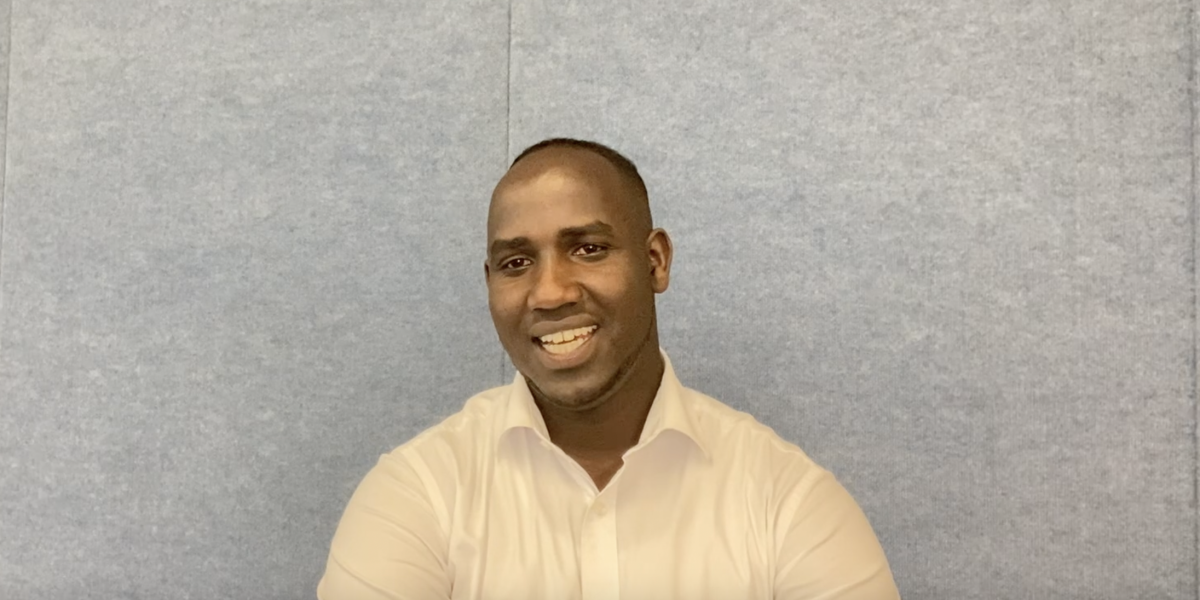JRS/USA: An Interview with Mondiant Dogon
26 May 2023|Brooke Wood

Mondiant Dogon, an esteemed author whose life has been marked by literary brilliance and unwavering resilience, was born into humble beginnings in the Democratic Republic of Congo. He experienced a defining moment in his life when he was merely three years old. A Hutu and lifelong friend of his father arrived at their doorstep brandishing a machete, issuing a chilling warning of imminent danger and the family’s impending demise.
Fearing for their lives, the family immediately embarked on their decades-long journey towards safety, starting their trek through the forests into Rwanda. Tragically, the camps that promised respite became breeding grounds for more violence, shattering any illusions of security. In a desperate bid to regain the life they had lost, Dogon ventured back to Congo, only to find himself incarcerated and coerced into the ranks of child soldiers.
But Dogon would defy the odds. With the help of JRS, he received an education, eventually graduating from college. He attributes the acquisition of his first notebook to JRS.
The author of “Those We Throw Away are Diamonds” recently sat down with JRS once more to discuss his life, his novel, and his connection with Jesuit Refugee Service as well as his own non-profit, Mondiant Initiative, which invests in supports and services that empower, educate and engage refugees.
JRS/USA: Where did the phrase “Those We Throw Away are Diamonds,” the title of your book, come from and what does it mean to you?
Mondiant Dogon: I started this book when I was in ninth grade, when I was in a refugee camp. I wrote a poem on World Refugee Day to tell the world that refugees can do anything when given the opportunity. That’s what I wanted to convey. They don’t have to throw refugees away because they’re still diamonds. When given the opportunity, they can do anything.
JRS/USA: You and your family were Tutsis, and from what I read, the family friend who came and warned you was a Hutu. We see a lot of conflict around the world between two different groups that don’t get along, for example, Israelis and Palestinians. What does it mean for you that someone from “the other side” was the one who came to tell you and save you? What does it tell you about people being able to talk across lines and help one another?
Mondiant Dogon: What I want to tell you is that these people who came to our door and told my dad that we had to leave, otherwise we would be killed, were the best friends of my dad. They were the people he went to school with, his best friends. I realized that humans are humans. I think many people try to draw a line in the sand, but we are all human beings. As long as we understand and respect each other, there is no need for conflict or violence. I learned so much from the conflicts between the Hutus and the Tutsis, especially during the genocide of the Tutsis in Rwanda in 1994.
JRS/USA: Can you talk a little bit about the impact that Jesuit Refugee Service had on your life?
Mondiant Dogon: Yes, since 1995 I lived in refugee camps. Life was crazy. I started my education under a tree. At that time, the organization that supported us was Jesuit Refugee Service… JRS. They provided me with my first pen, my first notebook, and my first school uniform. They supported me all the way until I finished ninth grade.
JRS/USA: Where do you think you’d be without Jesuit Refugee Service?
Mondiant Dogon: I’d be nothing. I wouldn’t have been able to go to school and finish high school.
JRS/USA: What would you like to tell people about refugees? There will be plenty of people who see this that may have no idea about refugees. They may have their own thoughts about what refugees are, who they are, and what their situation is. What would you like them to know?
Mondiant Dogon: Refugees are people like you, like me, like all of us. These are the people who normally flee their country to save their lives. Other than that, we are all human, we are all the same. These are the people who, when given the opportunity, can do great things. They are a community that the world needs to listen to because they have been through so much. I think what I can tell everybody is to lend an ear to these people, listen to them, support them in any way we can because they’ve been through so much. So I would say, listen to them, support them, and believe in and invest in this community.
 For the full interview with Mondiant, please visit this link.
For the full interview with Mondiant, please visit this link.
His novel, “Those We Throw Away are Diamonds,” details his and his family’s journey. We encourage you to learn more about Mondiant and support his work here.



